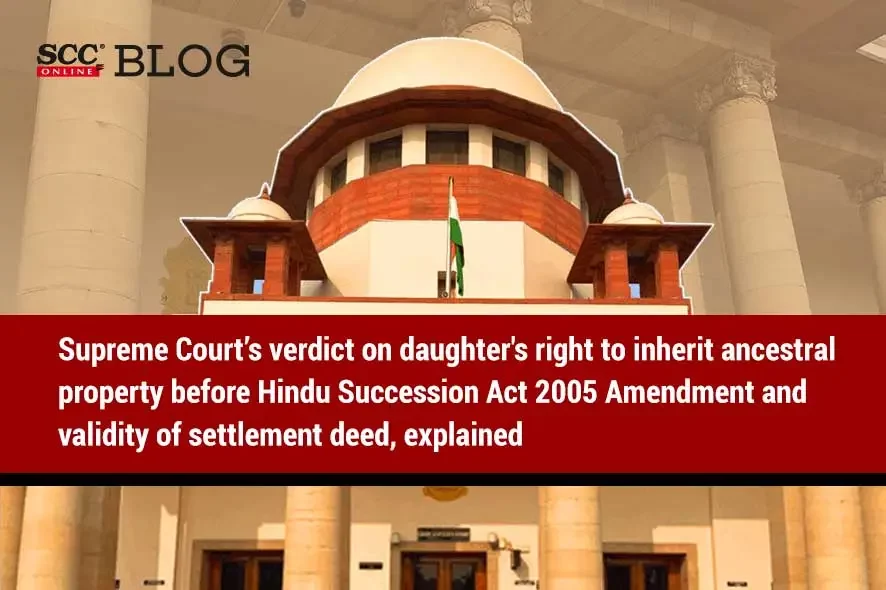Supreme Court: In two interrelated Civil Appeals challenging the judgment, order and decree passed by Division Bench of Orissa High Court affirming the Trial Court’s decision allowing cross-objection invalidating settlement deed entitling the daughters to share in scheduled properties, the Division Bench of J.B. Pardiwala* and A.S. Bopanna, JJ., upheld the two Court’s decision and modified the same to the extent of entitling daughters to 1/3rd share in all the scheduled properties.
Matter relates to partition of ancestral property of deceased (‘X’) between legal representatives and heirs of his late son and two daughters. On 3-12-1980, one daughter filed a suit for partition claiming 1/3rd share in the scheduled properties. The Trial Court decided in favour of the two daughters being entitled to share in ancestral and self-acquired properties including mesne profits. The son appealed against the said judgment and decree by Trial Court before the Orissa High Court on the ground that all the properties of X should have been held to be ancestral properties derived out of same nucleus of existing ancestral properties.
The Court noted that during the pendency of first appeal before the High Court, a settlement was entered into between X’s son and one of the daughters relinquishing her share based on Trial Court’s decree against consideration of Rs 50,000 and portions of subject land through compromise petition dated 29-03-1991. The son proceeded with a Letters Patent Appeal challenging the decision of Single Judge of High Court before the Division Bench of High Court. The Division Bench of High Court dismissed the appeal vide judgment and order dated 5-5-2011 and allowed the cross appeal filed by the daughter challenging the validity of settlement deed.
The Court examined the history of Hindu law regarding daughter’s right to inherit property, the true intent of Parliament in amending Section 6 of Hindu Succession Act Amendment, 2005 and development of Hindu Law vis-à-vis Badrinarayan Shankar Bhandari v. Omprakash Shankar Bhandari, 2014 SCC OnLine Bom 908. The Court also looked into the decision in Ganduri Koteshwaramma v. Chakiri Yanadi, (2011) 9 SCC 788 observing parity of rights in the coparcenary property among male and female members of a joint Hindu family through substituted Section 6 of 1956 Act.
The Court observed concepts that were settled before Vineeta Sharma v. Rakesh Sharma, (2020) 9 SCC 1 governing rights of parties – Prakash v. Phulavati, (2016) 2 SCC 36 restricting retrospective nature of Section 6, and conferment of full rights upon daughter coparcener in Danamma v. Amar, (2018) 3 SCC 343. The Court also relied on Vineeta Sharma (supra) wherein, the Court explained the retroactive application of daughter’s coparcenary right recognized by birth with effect from 9-9-2005. The Court noted that Section 6(5) of the 1956 Act restricts application to a partition effected before 20-12-2004 through execution deed or a final decree in partition suit. The Court relied on United Bank of India v. Abhijit Tea Co. (P) Ltd., (2000) 7 SCC 357 wherein it observed the Court’s duty to take notice of change in law and give effect accordingly.
On the pretext of the above cases, the Court upheld the decision of Trial Court and High Court in the instant case entitling the plaintiff to 1/3rd share in all properties of her father and observed that “As the law governing the parties has been amended before the conclusion of the final decree proceedings, the party benefitted by such amendment can make a request to the Trial Court to take cognizance of the Amendment and give effect to the same.” The Court rejected all properties to be ancestral properties.
Regarding the High Court allowing cross-appeal challenging alleged compromise, the Court reiterated the settled position of statutory right to appeal in law and looked into Order XLI Rule 22 and Order XLIII of Rule 1-A (2) of Civil Procedure Code, 1908 and upheld the maintainability of cross appeal filed by the daughter being entitled to question the legality and validity of settlement deed.
To consider the validity and binding effect of the settlement deed, the Court scrutinized Order XXIII Rule 3 of CPC required to be duly written and signed by the parties and a completed agreement capable of being embodied in a decree. The Court noted that the plaintiff has not put her signature on the settlement deed produced before the High Court and thus, found the settlement unlawful. The Court clarified that “In a suit for partition of joint property, a decree by consent amongst some of the parties cannot be maintained”. The Court upheld the High Court rejecting the settlement deed for being unlawful.
The Court modified the decree of Trial Court affirmed by High Court to the extent of entitling daughters to 1/3rd share in all the scheduled properties. The Court rejected appellants’ entitlement to any of the daughters’ share in the suit properties. The Court directed appellants to furnish accounts before Trial Court since the son was appointed as receiver.
[Prasanta Kumar Sahoo v. Charulata Sahu, 2023 SCC OnLine SC 360, judgment dated 29-3-2023]
Judgment authored by: Justice J.B. Pardiwala
Advocates who appeared in this case :
For Appellants: Advocate on Record Ashok Panigrahi, Advocate Geetanjali Das Krishnan, Advocate Nabab Singh
For Respondents: Advocate on Record B. Sunita Rao, Advocate on Record Shibashish Misra, Advocate on Record Anurag, Senior Advocate V. Chitambaresh, Advocate Sonal Gupta, Advocate Govind Venugopal








Thank you for sharing this wonderful and very informative article with us. The content is well explained, I will bookmark this for future reference. Thank you!